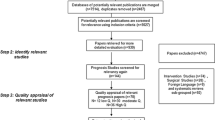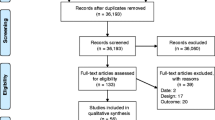Abstract
Introduction Return-to-work (RTW) status is an often used outcome in work and health research. In low back pain, work is regarded as a normal activity a worker should return to in order to fully recover. Comparing outcomes across studies and even jurisdictions using different definitions of RTW can be challenging for readers in general and when performing a systematic review in particular. In this study, the measurement properties of previously defined RTW outcomes were examined with data from two studies from two countries. Methods Data on RTW in low back pain (LBP) from the Canadian Early Claimant Cohort (ECC); a workers’ compensation based study, and the Dutch Amsterdam Sherbrooke Evaluation (ASE) study were analyzed. Correlations between outcomes, differences in predictive validity when using different outcomes and construct validity when comparing outcomes to a functional status outcome were analyzed. Results In the ECC all definitions were highly correlated and performed similarly in predictive validity. When compared to functional status, RTW definitions in the ECC study performed fair to good on all time points. In the ASE study all definitions were highly correlated and performed similarly in predictive validity. The RTW definitions, however, failed to compare or compared poorly with functional status. Only one definition compared fairly on one time point. Conclusions Differently defined outcomes are highly correlated, give similar results in prediction, but seem to differ in construct validity when compared to functional status depending on societal context or possibly birth cohort. Comparison of studies using different RTW definitions appears valid as long as RTW status is not considered as a measure of functional status.
Similar content being viewed by others
References
Franche RL, Carnide N, Hogg-Johnson S, Cote P, Breslin FC, Bultmann U, et al. Course, diagnosis, and treatment of depressive symptomatology in workers following a workplace injury: a prospective cohort study. Can J Psychiatry. 2009;54(8):534–46.
Bultmann U, Franche RL, Hogg-Johnson S, Cote P, Lee H, Severin C, et al. Health status, work limitations, and return-to-work trajectories in injured workers with musculoskeletal disorders. Qual Life Res. 2007;16(7):1167–78.
Young AE, Wasiak R, Roessler RT, McPherson KM, Anema JR, van Poppel MNM. Return-to-work outcomes following work disability: Stakeholder motivations, interests and concerns. J Occup Rehab. 2005;15(4):543–56.
Young AE, Roessler RT, Wasiak R, McPherson KM, van Poppel MNM, Anema JR. A developmental conceptualization of return to work. J Occup Rehab. 2005;15(4):557–68.
Wasiak R. Work retention and nonspecific low back pain. Point of view. Spine. 2006;31(16):1858–9.
Wasiak R, Pransky G, Verma S, Webster B. Recurrence of low back pain: definition-sensitivity analysis using administrative data. Spine. 2003;28(19):2283–91.
Wasiak R, Pransky GS, Webster BS. Methodological challenges in studying recurrence of low back pain. J Occup Rehab. 2003;13(1):21–31.
Baldwin ML, Butler RJ. Upper extremity disorders in the workplace: costs and outcomes beyond the first return to work. J Occup Rehab. 2006;16(3):303–23.
Briand C, Durand MJ, St Arnaud L, Corbiere M. Work and mental health: learning from return-to-work rehabilitation programs designed for workers with musculoskeletal disorders. Int J Law Psychiatry. 2007;30(4–5):444–57.
Dionne CE, Von Korff M, Koepsell TD, Deyo RA, Barlow WE, Checkoway H. A comparison of pain, functional limitations, and work status indices as outcome measures in back pain research. Spine (Phila Pa 1999);24(22):2339–45.
Wasiak R, Young AE, Roessler RT, McPherson KM, van Poppel MN, Anema JR. Measuring return to work. J Occup Rehabil. 2007;17:766–81.
De Vet HCW, Heymans MW, Dunn KM, Pope DP, van der Beek AJ, Macfarlane GJ, et al. Episodes of low back pain—a proposal for uniform definitions to be used in research. Spine. 2002;27(21):2409–16.
Steenstra IA, Verbeek JH, Heymans MW, Bongers PM. Prognostic factors for duration of sick leave in patients sick listed with acute low back pain: a systematic review of the literature. Occup Environ Med. 2005;62(12):851–60.
Goertz MN. Prognostic indicators for acute low-back pain. Spine. 1990;15(12):1307–10.
Bombardier C. Outcome assessments in the evaluation of treatment of spinal disorders: summary and general recommendations. Spine. 2000;25(24):3100–3.
Deyo RA, Battie M, Beurskens AJ, Bombardier C, Croft P, Koes B, et al. Outcome measures for low back pain research. A proposal for standardized use. Spine. 1998;23(18):2003–13.
Ostelo RW, Deyo RA, Stratford P, Waddell G, Croft P, Von KM, et al. Interpreting change scores for pain and functional status in low back pain: towards international consensus regarding minimal important change. Spine. 2008;33(1):90–4.
Stratford PW, Binkley J, Solomon P, Gill C, Finch E. Assessing change over time in patients with low back pain. Phys Ther. 1994;74(6):528–33.
Streiner D, Norman G. Health measurement scales. 3rd ed. Oxford: Oxford University Press; 2003.
Kleinbaum D, Klein M. Survival analysis. 2nd ed. New York: Springer; 2005. p. 331.
Baldwin ML, Johnson WG, Butler RJ. The error of using returns-to-work to measure the outcomes of health care. Am J Ind Med. 1996;29(6):632–41.
Fulton-Kehoe D, Gluck J, Wu R, Mootz R, Wickizer TM, Franklin GM. Measuring work disability: what can administrative data tell us about patient outcomes? J Occup Environ Med. 2007;49(6):651–8.
Leyshon RT, Shaw L. Using multiple stakeholders to define a successful return to work: a concept mapping approach. Work; 2010 (In press).
Sinclair SJ, Hogg-Johnson SH, Mondloch MV, Shields SA. The effectiveness of an early active intervention program for workers with soft-tissue injuries. The Early Claimant Cohort Study. Spine. 1997;22(24):2919–31.
Cole DC, Mondloch MV, Hogg-Johnson S. Listening to injured workers: how recovery expectations predict outcomes–a prospective study. CMAJ. 2002;166(6):749–54.
Hogg-Johnson S, Cole DC. Early prognostic factors for duration on temporary total benefits in the first year among workers with compensated occupational soft tissue injuries. Occup Environ Med. 2003;60(4):244–53.
Anema JR, Steenstra IA, Bongers PM, de Vet HC, Knol DL, Loisel P, et al. Multidisciplinary rehabilitation for subacute low back pain: graded activity or workplace intervention or both?: a randomized controlled trial. Spine. 2007;32(3):291–8.
Steenstra IA, Anema JR, Bongers PM, de Vet HCW, van Mechelen W. Cost effectiveness of a multi-stage return to work program for workers on sick leave due to low back pain, design of a population based controlled trial [ISRCTN60233560]. BMC Musculoskeletal Disorders. 2003;4:26.
Cronbach LJ, Meehl PE. Construct validity in psychological tests. Psychol Bull. 1955;52(4):281–302.
Riddle DL, Stratford PW. Roland-Morris scale reliability. Phys Ther. 2002;82(5):512–5.
Roland M, Morris R. A study of the natural history of back pain. Part I: development of a reliable and sensitive measure of disability in low-back pain. Spine. 1983;8(2):141–4.
Ware JE, Snow MS, Kosinski M, Gandek B. SF-36 health survey manual and interpretation guide. Boston: The Health Institute, New England Medical Center; 1993.
Pineo PC, Porter J, Mcroberts HA. 1971 census and socioeconomic classification of occupations. Canadian Review of Sociology and Anthropology-Revue Canadienne de Sociologie et D Anthropologie. 1977;14(1):91–102.
Steenstra IA, Anema JR, van Tulder MW, Bongers PM, De Vet HCW, van Mechelen W. Economic evaluation of a multi-stage return to work program for workers on sick-leave due to low back pain. J Occup Rehab. 2006;16(4):557–78.
Collett D. Modelling survival data in medical research. London: Chapman & Hall; 1994.
Hanley JA, McNeil BJ. The meaning and use of the area under a receiver operating characteristic (ROC) curve. Radiology. 1982;143(1):29–36.
SPSS 16.0, SPSS Inc., IL, USA.
Verbeek JHAM, Anema JR, Everaert CPJ, Foppen G, Heymans MW, Hlobil H, et al. Richtlijn: Handelen van de bedrijfsarts bij werknemers met rugklachten. 11-9-2006. NVAB.
Weevers HJ, van der Beek AJ, van den Brink-Muinen A, Bensing J, Boot CR, van Mechelen W. Communication about work between general practitioners and patients consulting for musculoskeletal disorders. Qual Prim Care. 2009;17(3):197–203.
Coole C, Watson PJ, Drummond A. Staying at work with back pain: patients’ experiences of work-related help received from GPs and other clinicians. A qualitative study. BMC Musculoskelet Disord. 2010;11:190.
Weevers HJ, van der Beek AJ, Anema JR, van der Wal G, van Mechelen W. Work-related disease in general practice: a systematic review. Fam Pract. 2005;22(2):197–204.
Kuh D, Ben-Shlomo Y, Lynch J, Hallqvist J, Power C. Life course epidemiology. J Epidemiol Commun Health. 2003;57(10):778–83.
Nachemson A. Work for all. For those with low back pain as well. Clin Orthop Relat Res. 1983;179:77–85.
Steenstra IA, Davilmar A, Hogg-Johnson S, Verbeek JHAM. Changes in the incidence of occupational disability as a result of back and neck pain in the Netherlands and Ontario, Canada after legislative changes. 2010 Aug 20; Angers, France: Seventh International Scientific Conference on Prevention of Work-Related Musculoskeletal Disorders PREMUS 2010; 2010 p. 38.
Steenstra IA, Verbeek JH, Prinsze FJ, Knol DL. Changes in the incidence of occupational disability as a result of back and neck pain in the Netherlands. BMC Public Health. 2006;6(1):190.
Author information
Authors and Affiliations
Corresponding author
Rights and permissions
About this article
Cite this article
Steenstra, I.A., Lee, H., de Vroome, E.M.M. et al. Comparing Current Definitions of Return to Work: A Measurement Approach. J Occup Rehabil 22, 394–400 (2012). https://doi.org/10.1007/s10926-011-9349-6
Published:
Issue Date:
DOI: https://doi.org/10.1007/s10926-011-9349-6




